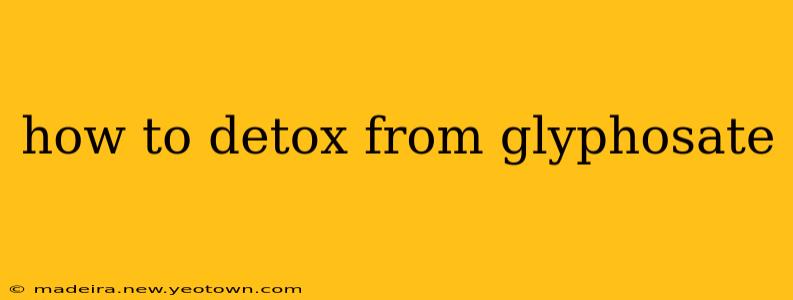How to Detox From Glyphosate: A Holistic Approach to Reducing Exposure
Glyphosate, the active ingredient in Roundup, is a widely used herbicide that has raised concerns about its potential health effects. While conclusive scientific evidence on the extent of its impact on human health is still debated, many people seek ways to reduce their exposure and support their body's natural detoxification processes. This isn't about a "cure" for glyphosate poisoning (which requires immediate medical attention), but rather a holistic approach to minimizing exposure and supporting your body's natural detoxification systems. This journey is personal, and what works for one person might not work for another. Always consult with your healthcare provider before making significant dietary or lifestyle changes, especially if you have pre-existing health conditions.
Understanding Glyphosate's Impact:
Glyphosate is a powerful chelating agent, meaning it binds to essential minerals in the body, potentially disrupting various metabolic processes. This chelation can affect mineral absorption, enzyme function, and overall cellular health. The concern is not just about acute poisoning, but about the long-term, low-level exposure that many people experience through their diet and environment.
What are the best ways to detoxify from glyphosate?
This question forms the core of many people's concerns. There's no single magic bullet, but a multi-pronged approach is often recommended.
1. Dietary Changes: The Foundation of Glyphosate Detox
The most impactful strategy is significantly reducing your exposure through diet. This involves:
-
Choosing Organic Foods: Organic produce is less likely to contain glyphosate residues compared to conventionally grown foods. Prioritize organically grown fruits, vegetables, grains, and beans. This is arguably the single most impactful step you can take.
-
Focusing on Glyphosate-Resistant Foods: While no food is entirely free from potential environmental contamination, some are less likely to absorb glyphosate. Prioritizing foods like non-GMO corn, and locally sourced produce can help minimize exposure.
-
Reducing Processed Foods: Processed foods often contain hidden sources of glyphosate or other chemicals. Opt for whole, unprocessed foods whenever possible.
-
Increasing Antioxidant Intake: Antioxidants can help neutralize free radicals and support the body's detoxification processes. Focus on colorful fruits and vegetables rich in vitamins C and E, as well as berries, leafy greens, and cruciferous vegetables.
2. Supporting Liver and Kidney Function:
Your liver and kidneys are your body's primary detoxification organs. Supporting their optimal function is crucial:
-
Hydration: Drink plenty of clean, filtered water throughout the day to help flush out toxins.
-
Liver-Supporting Foods: Incorporate foods known to support liver health, such as cruciferous vegetables (broccoli, kale, Brussels sprouts), artichokes, and beets.
-
Avoid Overburdening the Liver: Limit alcohol consumption and avoid exposure to other toxins as much as possible.
3. Gut Health: The Unsung Hero of Detoxification
A healthy gut microbiome is crucial for overall health, including detoxification.
-
Probiotics: Incorporate probiotics through fermented foods like yogurt, kefir, sauerkraut, or kimchi, or consider a probiotic supplement.
-
Prebiotics: Consume prebiotic foods like bananas, onions, garlic, and asparagus to feed beneficial gut bacteria.
-
Gut-Supporting Herbs: Consider herbs traditionally used to support digestive health, such as ginger and peppermint. Always consult with a healthcare professional before using herbal remedies.
4. Binding Agents and Chelators (Consult Your Doctor First):
Some people explore using binding agents like chlorella or zeolite to help bind to glyphosate and aid in its elimination. However, it is crucial to consult with a qualified healthcare professional before using these, as they can have potential side effects and interactions with other medications.
5. Other Considerations:
-
Water Filtration: Using a high-quality water filter can help reduce exposure to glyphosate and other contaminants in your drinking water.
-
Environmental Awareness: Minimize your exposure to glyphosate in your environment by avoiding areas where it's sprayed, wearing protective clothing when gardening, and opting for natural lawn care methods.
Disclaimer: This information is for educational purposes only and does not constitute medical advice. Always consult with a qualified healthcare professional before making any significant changes to your diet or lifestyle, especially if you have pre-existing health conditions or are taking medications. The information provided here is based on current research and understanding, but ongoing research continues to refine our knowledge of glyphosate's effects on human health.

